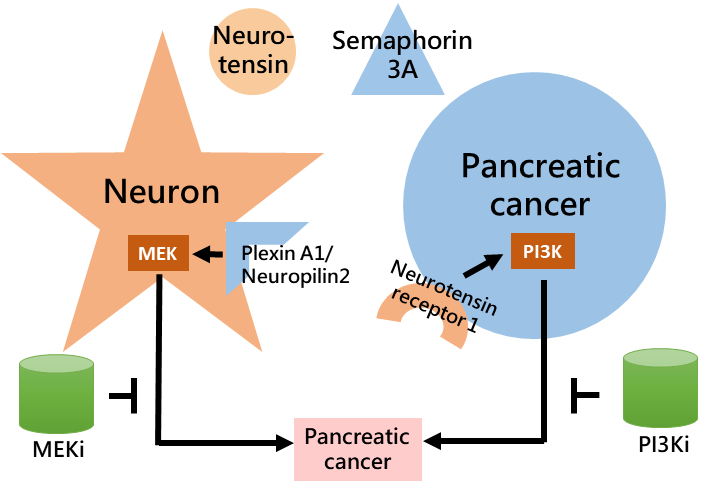Pancreatic cancer is still one of the silent killers around the world. Even surgery, chemotherapy, targeted therapy, and novel therapy are available or under investigation for treatment, they provide limited success in reducing mortality. Besides pancreatic cancer cell, its microenvironment is equally important in research and treatment, as many reviews discuss the roles of fibroblast and immune cell in such environment. Depending on subtype, fibroblast may display both pro- or anti-tumor effects on pancreatic tumorigenesis. Depending on population of immune cell, pancreatic cancer formation is affected by CD8+ T cell for suppression or anti-inflammatory (M2) macrophage for promotion. In addition to fibroblast and immune cell, neuron is reported to mainly support pancreatic cancer by providing neural factor as stimulant and neural tract as route for dissemination. However, the prognostic power and therapeutic potential for neural factor in pancreatic cancer is less known, thus deserves further investigation.
By using systematic bioinformatic analyses we found factor neurotensin from neuron and semaphorin 3A from pancreatic cancer both predicted poor pancreatic cancer prognosis, and are potentially counteracted by small molecule inhibitors. The receptor for neurotensin, neurotensin receptor 1, predicted poor prognosis and is observed in pancreatic cancer. The receptors for semaphorin 3A, plexin A1 and neuropilin 2, associated with decreased survival and are observed in neuron. Neurotensin increased pancreatic cancer invasiveness via neurotensin receptor 1-PI3K -AKT axis. Semaphorin 3A increased neural migration via plexin A1/neuropilin 2-MEK-ERK axis. Inhibitor against PI3K or MEK counteracted the effect induced by neurotensin or semaphorin 3A, respectively. These inhibitions are observed in both 2D and 3D models in cell line experiment. In mouse experiment, knocking down neurotensin receptor 1 or semaphorin 3A in mouse pancreatic cancer cell line KPC led to decreased tumor growth of primary and/or secondary sites. These results suggested the importance of neural factor in pancreatic tumorigenesis and provided potential therapeutics for further treatment.
For future work we are dissecting the impact on pancreatic cancer immunity potentially resulted from neuron-derived neurotensin and pancreatic cancer-derived semaphorin 3A. This is due to the observation of differential recruitment of lymphocyte-like cell in mouse tumor of shLuc group. This phenomenon drove us to examine whether regulatory T cell or even other immune cell participate in pancreatic tumorigenesis driven by neurotensin or semaphorin 3A. Systematic bioinformatic analyses on datasets of public source or in-house one revealed that neurotensin associates with dysregulated myeloid cell population, while semaphorin 3A associates with dysregulated lymphoid cell population. Our cell line experiments preliminarily confirmed the changes of marker and/or factor of these immune cells being stimulated with neurotensin or semaphorin 3A. Besides further mechanistic dissection, we will stain mouse tumor of groups shLuc, shNTS, or shSEMA3A for markers of neuron, pancreatic cancer, myeloid cell, or lymphoid cell to see whether the association identified in bioinformatic analysis at mRNA level could be validated in tumors from mouse or even specimen at protein level. Further studies for mechanism, therapeutic, and in vivo confirmation will deepen our understanding of neural factor-regulated pancreatic tumorigenesis and its therapeutic potential for related research and potential treatment.
Graphical Abstract
Application and Highlights:
1.PI3K inhibitor for neurotensin-high pancreatic cancer treatment
2.MEK inhibitor for semaphorin 3A-high pancreatic cancer treatment
Research Team Members: Yu-Hsuan Hung, Li-Tzong Chen
Representative Department: Center for Cancer Research
Introduction of Research Team:
This team is part of the Center for Cancer Research for research and potential treatment for pancreatic cancer as well as other gastrointestinal cancers.
Contact Email: leochen@nhri.edu.tw, yhhhung2021@gmail.com
Publication:
1.Am J Cancer Res. 2024 Feb 15;14(2):448-466. eCollection 2024.
2.Am J Cancer Res. 2023 Aug 15;13(8):3417-3432. eCollection 2023.
Full-Text Article:

